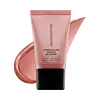What's inside
What's inside
 Key Ingredients
Key Ingredients

 Benefits
Benefits

 Concerns
Concerns

 Ingredients Side-by-side
Ingredients Side-by-side

Isododecane
EmollientHydrogenated Polyisobutene
EmollientEthylene/Propylene Copolymer
AbrasiveMica
Cosmetic ColorantEthylene/Propylene/Styrene Copolymer
Squalane
EmollientHyaluronic Acid
HumectantCoconut Alkanes
EmollientButylene/Ethylene/Styrene Copolymer
Hydrogenated Lecithin
EmulsifyingPentaerythrityl Tetra-Di-T-Butyl Hydroxyhydrocinnamate
AntioxidantCoco-Caprylate/Caprate
EmollientTitanium Dioxide
Cosmetic ColorantCI 77491
Cosmetic ColorantCI 77492
Cosmetic ColorantCI 77499
Cosmetic ColorantCI 15850
Cosmetic ColorantCI 77510
Cosmetic ColorantCI 73360
Cosmetic ColorantCI 77163
Cosmetic ColorantCI 19140
Cosmetic ColorantIsododecane, Hydrogenated Polyisobutene, Ethylene/Propylene Copolymer, Mica, Ethylene/Propylene/Styrene Copolymer, Squalane, Hyaluronic Acid, Coconut Alkanes, Butylene/Ethylene/Styrene Copolymer, Hydrogenated Lecithin, Pentaerythrityl Tetra-Di-T-Butyl Hydroxyhydrocinnamate, Coco-Caprylate/Caprate, Titanium Dioxide, CI 77491, CI 77492, CI 77499, CI 15850, CI 77510, CI 73360, CI 77163, CI 19140
Mica
Cosmetic ColorantCaprylic/Capric Triglyceride
MaskingBis-Diglyceryl Polyacyladipate-2
EmollientDiisostearyl Malate
EmollientMicrocrystalline Cellulose
AbsorbentPhenyl Trimethicone
Skin ConditioningDimethicone
EmollientCaffeine
Skin ConditioningCucumis Sativus Fruit Extract
EmollientBorago Officinalis Seed Oil
EmollientBoron Nitride
AbsorbentSilica
AbrasiveDimethicone/Vinyl Dimethicone Crosspolymer
Skin ConditioningEthylhexylglycerin
Skin ConditioningCaprylyl Glycol
EmollientCalcium Aluminum Borosilicate
Tin Oxide
AbrasiveCalcium Sodium Borosilicate
Synthetic Fluorphlogopite
Sodium Dehydroacetate
PreservativeTitanium Dioxide
Cosmetic ColorantIron Oxides
CI 77742
Cosmetic ColorantCI 15850
Cosmetic ColorantMica, Caprylic/Capric Triglyceride, Bis-Diglyceryl Polyacyladipate-2, Diisostearyl Malate, Microcrystalline Cellulose, Phenyl Trimethicone, Dimethicone, Caffeine, Cucumis Sativus Fruit Extract, Borago Officinalis Seed Oil, Boron Nitride, Silica, Dimethicone/Vinyl Dimethicone Crosspolymer, Ethylhexylglycerin, Caprylyl Glycol, Calcium Aluminum Borosilicate, Tin Oxide, Calcium Sodium Borosilicate, Synthetic Fluorphlogopite, Sodium Dehydroacetate, Titanium Dioxide, Iron Oxides, CI 77742, CI 15850
Ingredients Explained
These ingredients are found in both products.
Ingredients higher up in an ingredient list are typically present in a larger amount.
Ci 15850 is the pigment color red. It is an azo dye and created synthetically.
Azo dyes need to be thoroughly purified before use. This allows them to be more stable and longer-lasting.
This ingredient is common in foundations, lipsticks, and blushes. This color is described as brown/orangey red.
It has many secondary names such as Red 6 and Red 7. According to a manufacturer, Red 6 usually contains aluminum.
Learn more about CI 15850Mica is a naturally occurring mineral used to add shimmer and color in cosmetics. It can also help improve the texture of a product or give it an opaque, white/silver color.
Serecite is the name for very fine but ragged grains of mica.
This ingredient is often coated with metal oxides like titanium dioxide. Trace amounts of heavy metals may be found in mica, but these metals are not harmful in our personal products.
Mica has been used since prehistoric times throughout the world. Ancient Egyptian, Indian, Greek, Roman, Aztec, and Chinese civilizations have used mica.
Learn more about MicaTitanium dioxide is a mineral UV filter widely used in sunscreens and cosmetics.
It is one of only two UV filters officially classified as “mineral” by regulatory agencies, the other being zinc oxide.
Titanium dioxide provides broad-spectrum protection mostly in the UVB and UVAII range, with some protection in the UVAI range.
While its UVA protection isn’t as strong as zinc oxide’s, the difference is minor.
A common myth is that mineral UV filters reflect UV light. However, modern research shows titanium dioxide absorbs UV radiation like chemical filters (~95% absorption & 5% reflection).
Thanks to its non-irritating nature, titanium dioxide is suitable for sensitive, acne-prone, or redness-prone skin. It is unlikely to cause "eye sting" like other sunscreen ingredients.
A major drawback of this ingredient is its white cast and thick texture. This is why mineral sunscreens often leave a white cast and are less cosmetically elegant than chemical/hybrid sunscreens.
To improve white cast and spreadability, micronized or nano-sized titanium dioxide is often used.
There are ongoing concerns surrounding nano-titanium oxide's impact on marine ecosystems.
There is no conclusive evidence that any form of titanium oxide (or any other sunscreen ingredients) will cause harm to marine ecosystems or coral reefs. The science is still developing but many consumers are keeping a close eye on this issue.
Please note, many destinations have reef-safety sunscreen rules. For instance, the U.S. Virgin Islands advises all visitors to use non-nano mineral sunscreens.
Nano mineral sunscreens once raised safety concerns about absorption into skin.
Extensive research has shown that they do not penetrate healthy or damaged skin; they remain safely on the surface and the top layer of dead skin (stratum corneum).
You'll likely find titanium dioxide bundled with alumina, silica, or dimethicone. These ingredients help make titanium dioxide highly photostable; this prevents it from interacting with other formula components under UV light.
Learn more about Titanium Dioxide